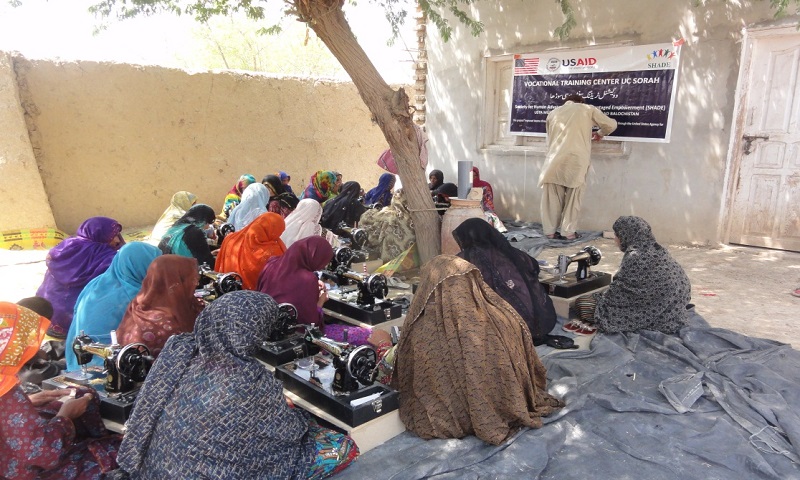
Society for Human Advancement and Disadvantaged Empowerment (SHADE) is a non-governmental, non- profit organization. It works to empower women and girls, as mentioned in the United Nations Charter and international conventions.Social, political and economic empowerment of women and girls is our mandate.
SHADE recently implemented a project successfully with the support of USAID at Union Councils Sorah and Cattle Farm in Jaffarabad District, Balochistan, Pakistan.The purpose of project was to increase the income generation capacity of women aged 18 to 45 by adopting alternative methods through skill training to the rural women and girls. One hundred women and girls were identified on a need basis from different villages of the Union Councils.
The Union Councils selected were the most underdeveloped areas of the district; both Councils chosen were completely under water during the floods of 2010 and 2012 and do not receive agricultural water for their main paddy crops. These conditions have exacerbated poverty in the area. The main source of income is agriculture, and the majority of people are tenants. Women and girls work in the fields to support their families.
The project was designed by consulting women and girls of the area, considering their needs and empowering them economically by adopting alternative methods of income generation. Women and girls identified on a need basis were given three months skill training on different trades.They were provided with raw material and equipment to practice their new skills at home to earn money and support their families. Different stakeholders like the district Social Welfare Department were involved to monitor the activities and replicate them in other areas of the district.
SKILL TRAINING AS AN INNOVATIVE POLICY
The majority of women in different villages in the area work in fields to earn and support their families. The conditions mentioned above further add into poverty in the area, with women and girls affected the worst. SHADE conducted a survey through Focus Group Discussions that involved women and girls, in order to find out ways to stop the escalating poverty in the area.
The 100 women and girls identified through the survey (based on need) were given skills training on Balochi and Sindhi hand embroidery and tailoring for three months.The organisation further trained them on marketing and on how to start a small household business. The organization built linkages at the market and established a display center at its office to facilitate the sale of beneficiaries’ products.The women and girls who used to work in the fields, adopted different ways to generate their income and this policy proved successful.
The Display Center
The SHADE Display Centre has provided a market for rural women and girls to successfully sell their products.Women from other areas are also sending their products for display, which has created enthusiasm among others in the area. Now they are adopting alternative methods of income generation to eradicate poverty.
IMPACT/SUCCESS STORY
Ms. Inayatan Khatoon of Qadir Abad village belongs to a poor family; she was one of our beneficiaries.She was pregnant at the time she was receiving training in addition to thee daughter and four sons all attending school. Working in the fields was not enough to earn and support family. Due increased poverty after the floods of 2010 and 2012, two of her daughters and two of her sons dropped out of schools as they could not afford the fees and other supplies. Ms. Khatoon could not provide clothes for her children as sewing charges were costly as well. After receiving training where she improved her embroidery and tailoring skills she is now earning well by preparing and selling products at the markets. Her children are back at school and she makes school clothes and house garments for her children and others.
SUGGESTIONS
There are many alternative ways for women and girls to eradicate poverty from the world, which will contribute towards achieving Sustainable Development Goals 1. SHADE’s project will be replicated in other areas in the future.
 Welcome to the United Nations
Welcome to the United Nations